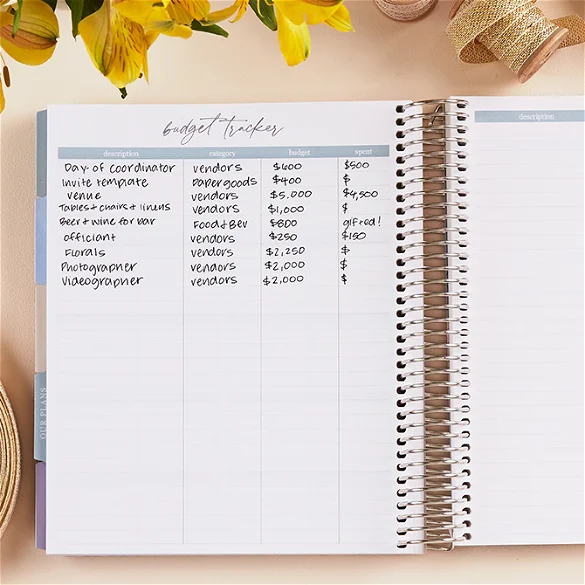Creating {and sticking to!} a wedding budget can be a challenging and potentially touchy subject. Use these tips to make it less stressful, but still effective!

1. Use a Spreadsheet or Fun Template
A spreadsheet is a great resource to keep all your budget tracking information in one place. By using a software like Microsoft Excel, you’re able to let the computer do all the math. Alternatively, there are a lot of visually-appealing templates on sites like Canva that you can customize to fit your needs.
For all you pen-and-paper brides, consider a paper wedding planner like this one from Erin Condren. It’s totally customizable with tons of design options and available in 12- and 18-month planners.


2. Utilize Industry Standards as a Starting Point
If you don’t know where to start, a good place is with industry standard percentages. After you nail down an overall budget, you can begin to plug in percentages to each category to help you stay within budget. Here are industry standards:
- Reception & Rentals: 40%
- Photography & Videography: 10%
- Wedding Consultant: 10%
- Wedding Attire: 8%
- Floral Decor: 7%
- Music & Other Entertainment: 7%
- Wedding Rings: 4%
- Stationary Elements: 3%
- Gifts: 3%
- Transportation & Lodging: 3%
- Wedding Cake: 2%
- Ceremony & Legal Issues: 2%
- Wedding Day Preparations: 1%
As you work through your unique budget, adjust the percentage allocations to meet your priorities.
3. Determine Your Priorities
A HUGE help in determining your budget is figuring out what is important to you and your partner. Insistent on gorgeous floral displays, but don’t care as much about stationary? Photography and videography is a big priority, but entertainment is on the back burner? Manipulate the above categories and percentages to match your desires and priorities for your big day!
4. Factor In “Hidden” Costs
Many cost, like taxes and fees, can go undetected until the last minute, which can be a big budget buster. On big purchases like catering, state and local taxes could be thousands of dollars. Catering, floral, and rental companies often charge a delivery or convince fee, so be sure to check your contracts and ask for clarification so you can budget correctly.
5. Determine Who’s Contributing & Who’s Attending
While this can be a touchy subject, it is very important to determine who wants to and is able to contribute to your wedding budget. Also, determining a rough estimate of guest count early on will allow you to get more accurate quotes.
If you are planning a wedding in Roanoke Virginia, Richmond Virginia, Fredericksburg/Northern Virginia, The Shenandoah Valley, Coastal Virginia or in Charlottesville/ Lynchburg Va. we can help with your wedding planning and ideas.



